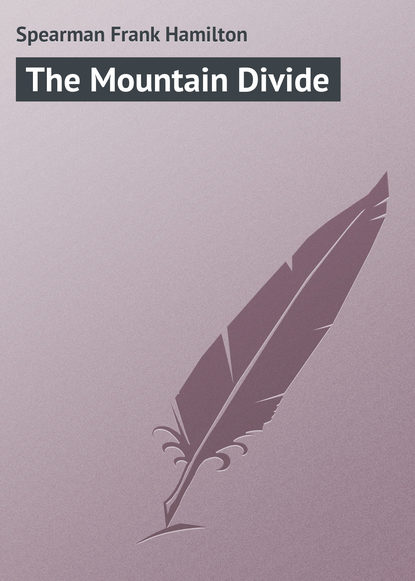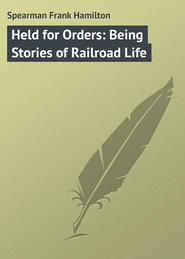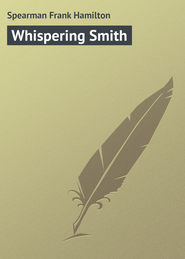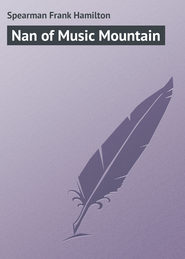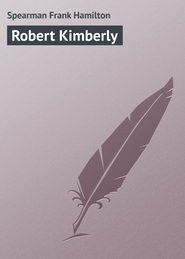По всем вопросам обращайтесь на: info@litportal.ru
(©) 2003-2024.
✖
The Mountain Divide
Автор
Год написания книги
2017
Настройки чтения
Размер шрифта
Высота строк
Поля
But the place was lonely beyond words, and Bucks had a hard time to keep it from being too much so for him. He walked at different times over the country in every direction, and one night after a crudely prepared supper he strolled out on the platform, desperate for something to do. Desolation marked the landscape everywhere. He wandered aimlessly across the track and seeing nothing better to interest him began climbing Point of Rocks.
The higher he climbed the more absorbed he became. Youth and strength lent ardor to the ascent, and Bucks, soon forgetting everything below, was scaling the granite pile that towered above him. For thirty minutes, without a halt, he continued to climb, and reaching after a while what seemed the highest ledge of the rocky spur, he walked out upon it to the very edge and was rewarded for his labor with a magnificent panorama of the mountain divide.
In the west the sky was still golden and, though clouds appeared to be banking heavily in the north, the view of the distant peaks was unobstructed. From where he sat he could almost have thrown a stone into one tiny mountain stream that cut a silver path toward the setting sun, and another, a hundred yards away, that flowed gently toward the rising sun. And he knew–for Bill Dancing had told him–that the one rill emptied at last into the Pacific Ocean, and the other into the Atlantic Ocean. Alongside these tiny streams he could plainly trace the overland trail of the emigrant wagons, and, cutting in straighter lines, but following the same general direction, lay the right-of-way of the new transcontinental railroad.
Beyond, in every direction, stretched great plateaus, and above these rugged mountain chains, lying in what seemed the eternal solitude of the vast desert. He was alone with the sunset, and stood for some moments silenced by the scene before him. When a sound did at length reach his ear as he sat spellbound, it brought him back to himself with the suddenness of a shock.
At first he heard only distant echoes of a short, muffled blow, irregularly repeated and seeming familiar to the ear. As he speculated upon what the sound might be, it grew gradually plainer and came seemingly nearer. He bent his eyes down the valley to the west and scanned the wagon-trail and the railroad track as far as he could in the dusk, but could see nothing. Then the muffle of the sound was at once lifted. It came from the other direction, and, turning his eyes, he saw emerging from a small canyon that hid the trail to the east, a covered emigrant wagon, drawn by a large team of horses and driven by a man sitting in front of the hood, making its way slowly up the road toward the station.
The heavy play of the wheel-hubs on the axles echoed now very plainly upon his ears, and he sat watching the outfit and wondering whether the travellers would camp for the night near him and give him what he craved most of all, a little human society. The horses passed the station, and as they did so, the driver peered intently at the new building, looking back around the side of the canvas cover, and straining his neck to see all he could see, while the horses moved along.
This would have seemed to Bucks mere idle curiosity had he not noticed that some one within the wagon parted the canvas flaps at the rear as it went by and likewise inspected the building with close attention. Even this was no especial incident for wonderment, nor was Bucks surprised when the emigrants, after pursuing their way until they were well out of sight of the station itself, guided their wagon from the trail into a little depression along the creek as if to make camp for the night. The driver, a tall, thin man, wearing a slouch hat, got down from the front of the wagon and walked with a shambling gait to the head of his horses and loosened their bridles. While the horses were drinking, a second man, carrying a rifle, climbed down from the rear of the wagon. He was of a shorter and stockier build, and on one side the brim of his soft hat had been torn away so that it hung loosely over one ear, the other ear being covered only by a shock of dusty hair.
A third man emerged from under the canvas cover, dropping down almost behind the second–a fat man who looked about him with suspicion as he slowly drew a rifle out of the wagon. The driver joined his companions for a brief conference, and when it was finished the three men, examining their rifles, walked back up the road toward the station. As they neared it, two of them loitered back and presently took their places behind convenient rocks where, without being seen, they could see everything. The third man, the driver, carrying his rifle on his arm, walked ahead, crossed the road, and, proceeding with some care, stepped up on the platform and pushed open the door of the station building.
Bucks, perched high on the rocky spur above the scene, looked on, not knowing just what to make of it all. As he saw the two men conceal themselves, he wondered what sort of a call the third man intended making on the new agent, and why he should leave two armed men close at hand in ambush when calling on one lone telegraph operator. Bucks began to feel a bit creepy and watched the scene unfolding below with keen attention. The driver of the wagon getting no response as he opened the door, walked inside, and for a moment was not seen. He soon reappeared, and, stepping to the side of the building signalled his companions to come up. Bucks saw them emerge from their hiding-places and join the driver at the station door.
A second conference followed. It was briefer than the first, but there seemed some difference of opinion among the three men, and the talk terminated abruptly by the driver’s clubbing his rifle and deliberately smashing in the sash of the window before which he was standing.
Whatever had held Bucks spellbound thus far released him suddenly for action when he saw the rifle-stock raised and heard the crash of the glass. He jumped up, and running to the edge of the ledge nearest the station yelled at the marauder and shook his finger at him vigorously. The attack on his habitation was too much for Bucks’s composure, and, although he knew his words could not be heard from where he stood, he felt he could frighten the intruders.
This was his second mistake. No sooner had his visitors sighted him than two guns were turned on him and instantly fired. He jumped back before the fat man, who, slower than his companions, had some difficulty in shooting so high above his head, could get his gun up. Afterward, Bucks learned how providential this was, inasmuch as the big fellow was the deadliest shot of the three.
But at the moment, danger was the last thing the operator thought of. The unprovoked and murderous attack infuriated him, and again forgetting his caution he drew his own revolver without hesitation, and, running to a more protected spot, leaned over the ledge and fired point-blank into the group, as they looked up to see what had become of him.
If it had been his intention to hit any one of them with his bullets, his shooting was a failure and some experience in after years among men practised in gunnery convinced him that to aim at three men is not the right way to hit one.
But if he had meant only to create a sensation his move was successful beyond his greatest expectation. Had a bomb been exploded on the platform the marauders could not have scattered more quickly. Bucks never in his life had seen three men move so fast. The fat man, indeed, had given Bucks the impression of being heavy and slow in his movements. He now made a surprising exhibition of agility, and Bucks to his astonishment, saw him distancing his leaner companions and sprinting for the shelter at a pace that would have made a jack-rabbit take notice.
Bucks, somewhat keyed up, fired twice again at the fleeing men, but with no more effect than to kick up the dust once behind and once ahead of them as they ran. The instant they reached the rocks where they found shelter Bucks drew back out of sight, and none too soon, for as he pulled himself away from the ledge, a rifle cracked viciously from below and the slug threw a chunk of granite almost up into his face; the fat man was evidently having his innings.
Bucks, out of immediate danger, lay perfectly still for a few moments casting up the strange situation he found himself in. Why the men should have acted as they had, was all a mystery, but thieves or outlaws they evidently were, and outlaws in this country he already well knew were men who would stop at nothing.
He realized, likewise, that he was in grave danger. The night was before him. No train would be through before morning. He could not reach his key by which he might have summoned aid instantly. For a moment he lay thinking. Then taking off his hat he stuck his head carefully forward; it was greeted at once by a bullet. The lesson was obvious and next time he wanted to reconnoitre he stuck his hat forward first on the muzzle of his gun, as he had often read of frontiersmen doing, and, having drawn a shot, stuck his head out afterward for a quick look. All that remained in the open was the team and wagon, but this left the outlaws at a disadvantage, for if they wanted to get their outfit and go on their way they must expose themselves to Bucks’s fire. While they might feel that one operator, armed with a revolver he hardly knew how to use, was not a dangerous foe, a Colt’s, even in the hands of a boy who had thus far fired first and aimed afterward, was not wholly to be despised. An accident might happen even under such conditions, and the three men, knowing that darkness would soon leave them free, waited in absolute silence.
Night fell very soon and the light of the stars, though leaving objects visible upon the high ledge, left the earth in impenetrable darkness. Strain his eyes as he would, Bucks could perceive nothing below. He could hear, however, and one of the first sounds audible was that of the wagon moving quietly away. It was a welcome sound, even though he dared not hope his troublesome visitors would withdraw without further mischief. His chief concern at this juncture was to get safely, if he could, down the rocks and into the station to give the alarm to the despatcher; for he made no doubt that the outlaws, on their wagon trip west, would damage in any way they might be able railroad supplies and property along their way.
Before Bucks had climbed down very far and after he had made one or two startling missteps, he began to consider that it was one thing to get up a rough arête in daylight and quite another to get down one in the darkness. The heavy clouds moving down from the north had massed above Point of Rocks, and he heard once in a while an ominous roll of thunder, as he slipped and slid along and bruised his hands and feet upon the rocks.
He had with great care got about half-way down, when the pitch darkness below him was pierced by a small flame which he took at first for the blaze of a camp fire. In another moment he was undeceived. The station was on fire. It was evidently the last effort of the outlaws to wreak vengeance as they left. Bucks clambered over the rocks in great alarm. He thought he might reach the building in time to save it, and, forgetting the danger of being shot should his enemies remain lying in wait, he made his way rapidly down the Point. The flames now burst from the east window of the station, and he despaired of saving it, but he hurried on until he heard the crack of a rifle, felt his cap snatched from his head and fell backward against the face of the rock. As he lost consciousness he slipped and rolled headlong down the steep ledge.
CHAPTER XVII
How long Bucks lay in the darkness he did not know, but he woke to consciousness with thunder crashing in his ears and a flood of rain beating on his upturned face. When he opened his eyes he was blinded by sheets of lightning trembling across the sky, and he turned his face from the pelting rain until he could collect himself.
While he lay insensible from the shock of the bullet, which providentially had only grazed his scalp, the storm had burst over the mountains drowning everything before it. Water fell in torrents, and the desert below him was one wide river. Water danced and swam down the rocks and ran in broad, shallow waves over the sand, and the scene was light as day. Thunder peals crashed one upon another like salvoes of artillery, deafening and alarming the confused boy, and the rain poured without ceasing. Continuing waves of lightning revealed the railroad and station building before him and he realized that he had fallen the rest of the way down from where he had been fired at on the face of the Point.
He took quick stock of his condition and, rising to his feet, found himself only sore and bruised. He pressed his way through the flood to the track, gained the platform, and, judging rightly that his assailants had abandoned their fight, entered the half-burned building unafraid. Rain poured in one corner where the roof had burned away before the storm had put out the fire.
Stumbling through the débris that covered the floor, Bucks made his way to the operator’s table and put his hand up to cut in the lightning arrester. He was too late. The fire had taken everything ahead of him, and his hope of getting into communication with the despatchers was next dashed by the discovery that his instruments were wrecked.
He sat down–his chair was intact–much disheartened. But without delay he opened the drawer of the table and feeling for his box of cartridges found that the thieves had overlooked it. This he slipped into his pocket with a feeling of relief, and, as he sat, rain-soaked and with the water dripping from his hair, he reloaded his revolver and made such preparations as he could to barricade the inner door and wait for the passing of the storm.
From time to time, awed by the fury of the elements, he looked into the night. It seemed as if the valley as far as he could see was a vast lake that rippled and danced over the rocks. Bucks had never conceived of a thunderstorm like this. Until it abated there was nothing he could do, and he sat in wretched discomfort, hour after hour, waiting for the night to pass and listening to the mighty roar of the waters as they swept broadside down the divide carrying everything ahead of them. Before daylight the violence of the storm wore itself away, but the creek in the little canyon south of the right-of-way, dashing its swollen bulk against the granite walls, pounded and roared with the fury of a cataract.
When day broke, ragged masses of gray cloud scudded low across the sky. The rain had ceased, and in the operator’s room Bucks, aided by the first rays of daylight, was struggling to get the telegraph wires disentangled to send a message. His hopes, as the light increased and he saw the ruin caused by the fire, were very slender, but he kept busily at the wreckage and getting, at length, two severed strands of the wires to show a current, began sending his call, followed by a message for help to Medicine Bend. He worked at this for thirty minutes unceasingly, then, looking around on every side of the building, he satisfied himself that he was alone and, dropping down at his table, leaned upon it with his elbows, and, tired, wet, and begrimed, fell fast asleep.
He was roused by the distant whistle of a locomotive. Opening his eyes, he saw the sun streaming through the east side of the building where the window casement had burned away. Shaking off the heaviness of his slumber he hastened out to see an engine and box-car coming from the east. From the open door of the car men were waving their hats. Bucks answered by swinging his arm.
The engine stopped before the station and Bob Scott, followed by Dancing, Dave Hawk, and the train crew sprang from the caboose steps and surrounded him. They had brought two horses and Bucks saw that all the men were armed. It took only a minute to tell the story, and the party scattered to view the destruction and look for clues to the perpetrators.
Scott and Dancing were especially keen in their search, but they found nothing to suggest who the vandals were. They listened again to Bucks, as he repeated his story with more detail, and held a hurried conference in which Dave Hawk took charge. Meantime the men were tearing up planks from the platform to make a chute for unloading the horses.
Bucks’s excitement increased as he saw the businesslike preparations for the chase. “Have you any idea you can catch them, Bob?” he asked feverishly.
Bob Scott’s smile was not a complete answer. “How can you catch anybody in this country?” continued Bucks, regarding the scout sceptically. But Scott looked across the interminable waste of sage-brush and rock as if he felt at home with it.
“If they stick to the wagon,” he explained leisurely, “we will have them in an hour or two, Bucks. A man might as well travel around here with a brass band as to try to get away with a wagon track behind him. If they stick to the wagon, we are bound to have them in two or three hours at most. You are sure they didn’t have a led horse?”
“They had nothing but the team,” said Bucks.
“In that case if they give up the wagon, three of them will have to ride two horses. They can’t go fast in that way. We will get some of them, Bucks, sure–somehow, sometime, somewhere. We have got to get them. How could I hold my job if I didn’t get them?”
That which had seemed impossible to Bucks looked more hopeful after Bob had smiled again. Dancing was busy installing the new telegraph outfit. While this was going on, Scott saddled the horses and, when he and Dave Hawk had mounted, the two rode rapidly down the emigrant trail toward Bitter Creek. The train was held until Dancing could get the instruments working again; then, at Hawk’s request, it was sent down the Bitter Creek grade after himself and Scott; the trail followed the railroad for miles. Dancing remained with Bucks to guard against further attack.
The two railroad men rode carefully along the heavy ruts of the emigrant trail, from which all recent tracks had been obliterated by the flood, knowing that they would strike no sign of the wagon until it had been started after the storm. They had covered in this manner less than two miles when, rounding a little bend, they saw a covered emigrant wagon standing in the road not half a mile from the railroad track.
Scott led quickly toward concealment and from behind a shoulder of rock to which the two rode they could see that the wagon had been halted and the horses, strangely entangled in the harness, were lying in front of it. Scott and Hawk dismounted and, crawling up the shoulder where they could see without being seen, waited impatiently for some sign of life from the suspicious outfit. The description Bucks had given fitted the wagon very well, and the two lay for a time waiting for something to happen, and exchanging speculations as to what the situation might mean. They were hoping that the thieves might, if they had gone away, return, and with this thought restrained their impatience.
“It may be a trick to get us up to shooting distance, Bob,” suggested Hawk when Scott proposed they should close in.
“But that wouldn’t explain why the horses are lying there in that way, Dave. Something else has happened. Those horses are dead; they haven’t moved. Suppose I circle the outfit,” suggested Scott benevolently.
“Take care they don’t get a shot at you.”
“If they can get a shot at me before I can at them they are welcome,” returned Scott as he picked up his bridle rein. “From what Bucks told me I don’t think a great deal of their shooting. He is a level-headed boy, that long-legged operator.” And Scott, with some quiet grimaces, recounted Bucks’s story of his descent of Point of Rocks the night before, under the fire of the three desperadoes.
That he himself was now taking his own life in his hands as he started on a perilous reconnoissance, cost him no thought. Such a situation he was quite used to. But for a green boy from the East to put up so unequal a fight seemed to the experienced scout a most humorous proceeding.
He mounted his horse and directing Hawk what to do if he should be hit, set out to ride completely around the suspected wagon. The canvas cover was the uncertain element in the situation. It might conceal nobody, and yet it might conceal three rifles waiting for an indiscreet pursuer to come within range. Scott, taking advantage of the uneven country, rode circumspectly to the south, keeping the object of his caution well in view, and at times, under cover of friendly rocks, getting up quite close to it.
Before he had completed half his ride he had satisfied himself as to the actual state of affairs. Yet his habitual caution led him to follow out his original purpose quite as carefully as if he had reached no conclusion. When he crossed the trail west of the wagon, he looked closely for fresh tracks, but there were none. He then circled to the north and was soon able, by dismounting, to crawl under cover within a hundred yards of the heads of the horses. When he got up to where he could see without being seen he perceived clearly that his surmise had been correct.
Both horses lay dead in the harness. From the front seat of the wagon a boot protruded; nothing more could be seen. Scott now, by signals, summoned Dave Hawk from where he lay, and when the swarthy conductor reached the scout, Scott called out loudly at the wagon.
There was no answer, no movement, no sound. Things began to seem queer; in the bright blaze of sunshine, and with the parched desert glistening after the welcome rain, there in the midst of the vast amphitheatre of mountains lay the dead horses before the mysterious wagon. But nowhere about was any sign of life, and the wagon might hold within its white walls death for whoever should unwarily approach it.
Bob Scott had no idea, however, of sacrificing himself to any scheme that might have occurred to the enemy to lure him within danger. He called out again at the top of his voice and demanded a surrender. No sound gave any response, and raising his rifle he sent a bullet through the extreme top of the canvas cover midway back from the driver’s seat.





